APPLE TREE recently hosted a new edition of APPLE TREE BYTES, a series of meetings where marketing and communication professionals discuss current issues. This edition, titled New Horizons of Sustainable Communication, featured industry experts including Montse Sellarés, Communication and Activism Director at B Lab Spain; Ana Palencia, Communication and Sustainability Director at Unilever; José Guerra, Communication and Marketing Director at Agbar; and Laia Mas, Sustainability Business Partner at Mas Salmones. The session, moderated by journalist Xavier Graset and held at the Macaya Palace of the La Caixa Foundation in Barcelona, explored the impact of the new European directive on sustainable communication and how to effectively convey sustainable products and practices to the public.
You can watch the full session by clicking on the image below.
According to the European Banking Authority, the number of greenwashing cases in the European Union rose by 26% and by 21% globally in 2023 alone. The misuse of terms like ‘sustainable’, ‘eco’, and ‘bio’ by some companies has prompted the European Commission to approve a new directive, which the Spanish Ministry of Consumer Affairs is working to incorporate into the forthcoming Sustainable Consumer Law.
During the event, organized by APPLE TREE, experts agreed that this new regulation to combat greenwashing is an opportunity for companies that “are doing well” to operate within a standardized legal framework. Ana Palencia, noted, “I don’t think companies act in bad faith when communicating about sustainability. Sometimes there’s a lack of knowledge, which is why regulations can help create order. However, some companies are choosing to stay silent – green hushing – which I believe is not ideal, as it leads to missed business opportunities.”
José Guerra, Communication and Marketing Director at Agbar, added that sustainability communication should not reply solely on regulatory frameworks: “We have many tools and an increased awareness among citizens, as well as the European regulatory framework. Companies are equipping themselves with mechanisms and reinforcing their purpose to promote rigorous and ethical sustainable communication.”
The panel also discussed using ‘common sense’ and existing tools for crafting sustainability claims beyond the European regulations. References were made to the Sustainable Communication Guide by the Ministry of Consumer Affairs and Autocontrol’s work in promoting truthful advertising.
Tips for an effective communication strategy
In addition to the regulatory framework, the debate also examined how companies can enhance their sustainability communication to ensure their efforts are recognised by stakeholders. Laia Mas, with over twenty years of experience in the sector, stressed the importance of understanding sustainability before communicating, “You need to go out and assess your product from a sustainability perspective. Understand the environmental and social impacts and identify how to transform challenges into opportunities before communicating.”
Montse Sellarés, Director of Communications at B Lab Spain, added, “Before communicating, it’s essential to undergo internal transformation to ensure the credibility needed to communicate effectively. Authenticity, backed by data, transparency, and communicating with values are what connect with your audience.”
Ana Palencia, Communication and Sustainability Director at Unilever, emphasized the importance of generating emotion, “You need to communicate in a way that resonates with consumers so that they choose brands acting responsibly, rigorously, and honestly”.


